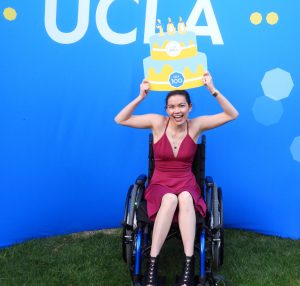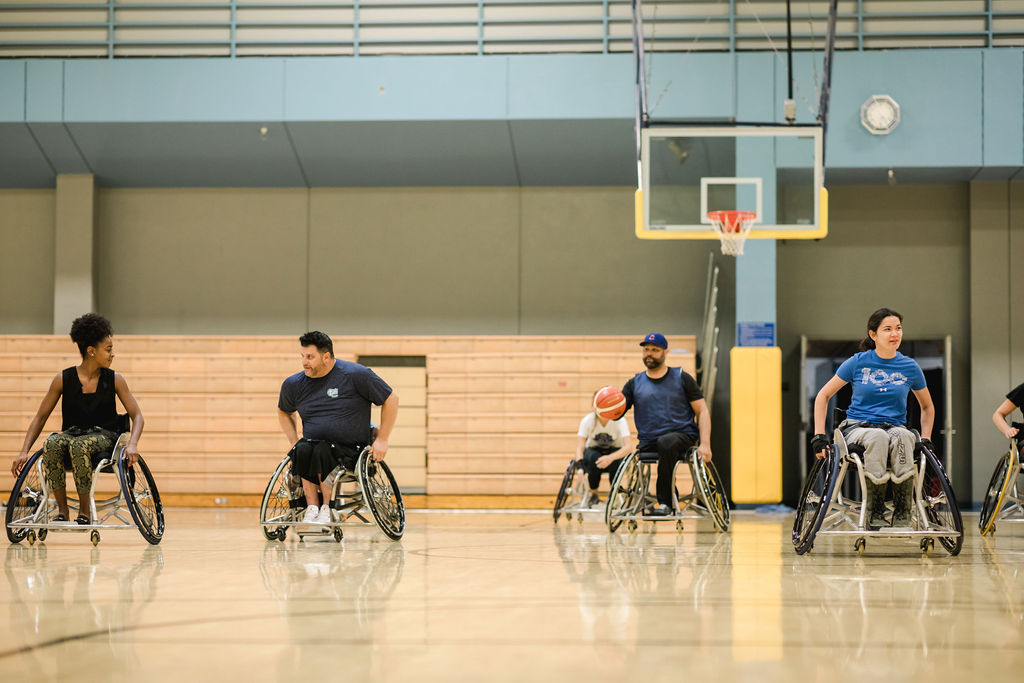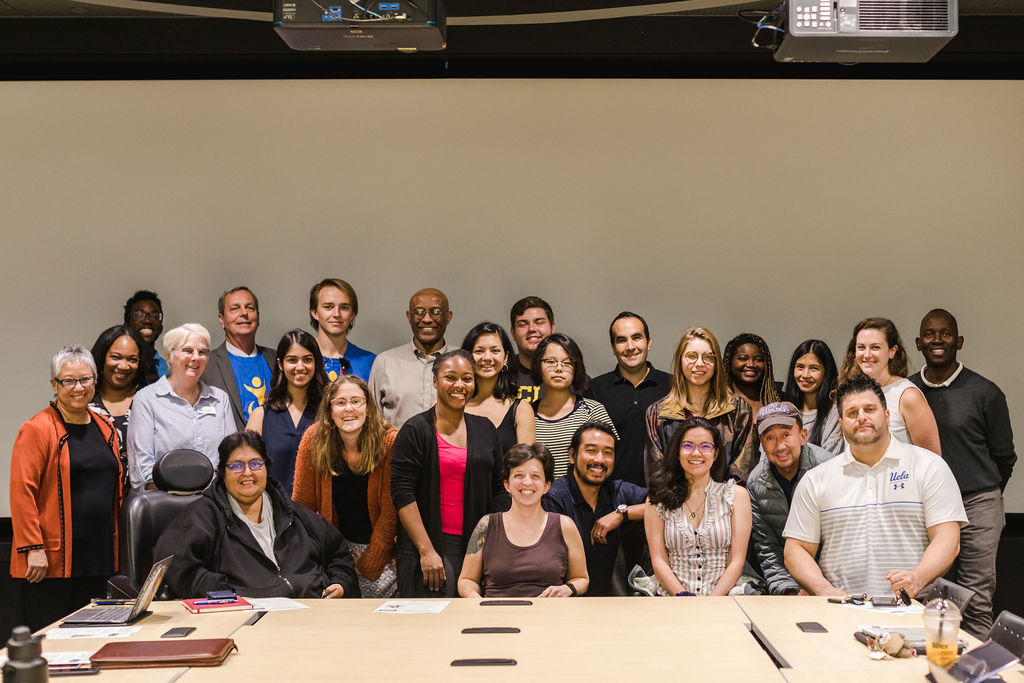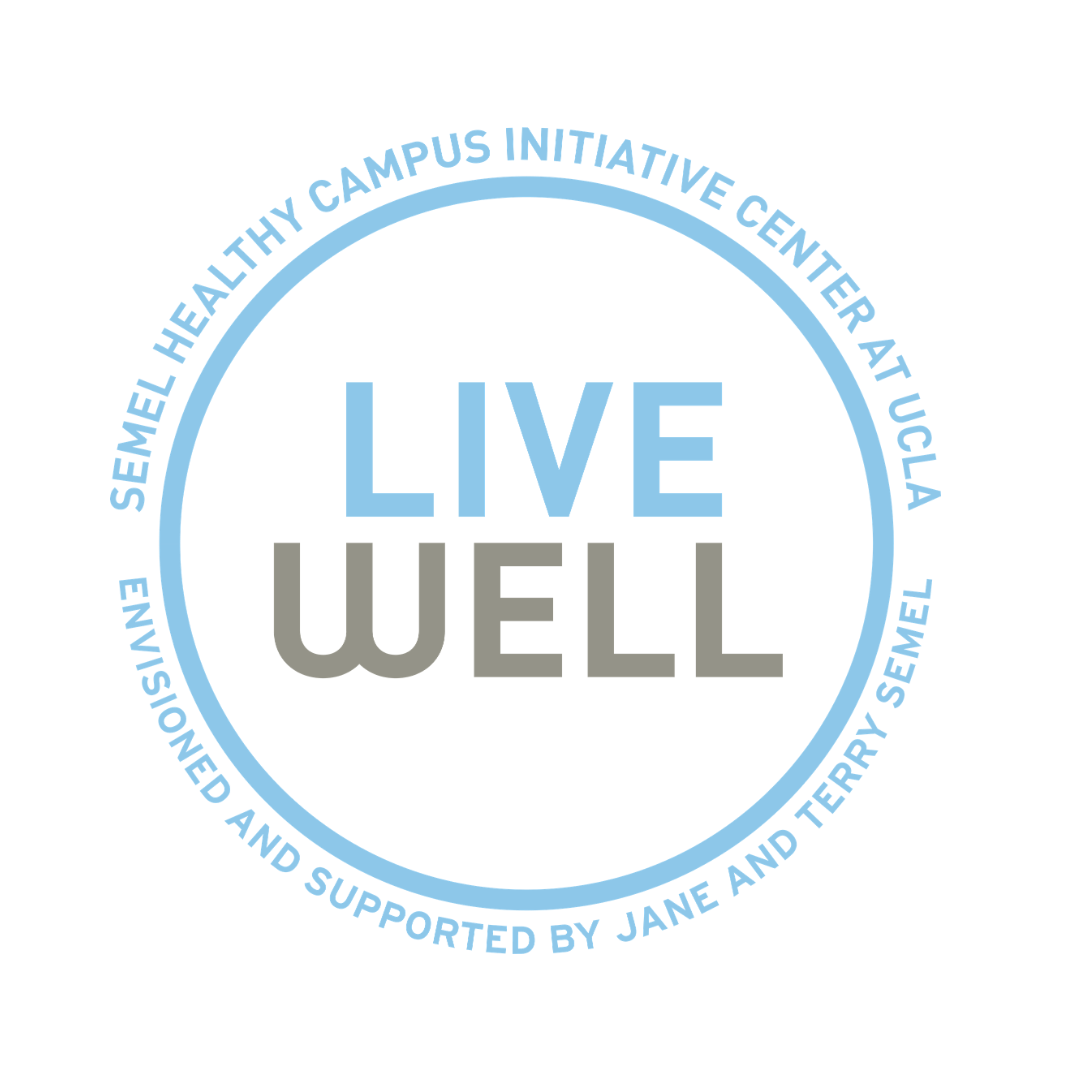Welcome to the UCLA Semel Healthy Campus Initiative Center Accessibility Toolkit!
What is the toolkit?
The toolkit is a series of documents and resources to help event planners create events and activities at UCLA that are welcoming to those with physical disabilities and accessibility concerns. Considering the accessibility and accommodation needs at the beginning of planning is a lot easier than trying to remedy issues that arise after reservations and arrangements have been made. Although universally accessible events are an unattainable ideal, for now, the Accessibility Toolkit will help optimize accessibility for your event.
Why was this toolkit created?
As of the 2016-2017 school year, there were 3,257 UCLA graduate and undergraduate students that identified having a disability and registered with the UCLA Center for Accessible Education (CAE). Of this total, 951 identified as having physical impairments of different types. UCLA’s total student population of approximately 45,000 students. This puts the physically disabled population at 2.1% of the total UCLA population. As a result, resources and activities for this demographic are severely limited and often overlooked. This can cause disabled students to feel isolated and ostracized. Usually inaccessibility of an event or activity is not caused intentionally and is often a surprise to those coordinating an event.
From the Author
I am a disabled UCLA alum who wanted to take all of my experiences as a student and use it constructively to help the UCLA community. This project of love and determination was a collective effort with many supportive students, staff and faculty. The concept of disability and the demographic is very complex and spans a wide variety of needs and experiences. I do not claim to be all-knowing about this topic and put in huge efforts to try and represent the demographic as honestly and thoroughly as possible. I am aware that my knowledge will never cover everything that should be said in this toolkit, and encourage all who have additions to the toolkit’s content to reach out. This toolkit is a living document to ensure everyone’s voices are heard, respected and appreciated.
Before you start…
Accessibility vs. Accommodation
Essentially, accommodations and accessibility requirements are two different concepts and need to be considered separately.
The considerations for accessibility are proactive, not to be confused with the mandate to provide legal accommodations as outlined in Section 504. Section 504 includes provisions for individuals with disabilities to participate in programs and services with the use of auxiliary aids, where necessary. These aids are commonly referred to as accommodations.
An accommodation is…
- Provided based on specific needs of a student with a documented disability
- Determined by an accommodations specialist on a case-by-case basis
- Provided for students whose needs require great intervention, such as American Sign
Language (ASL) interpreters or real-time captioning during class lecture - For circumstances that are difficult to anticipate and prepare for
Accessibility is…
- The responsibility of all who plan events or create or publish digital content in order to
ensure the event or content is accessible to all participants - Provided for all students, with no expectation of an explanation of need
- Expected for disabilities that are easily anticipated
NOTE: The author accurately uses the words accessibility and accommodation as often as possible. They believe full inclusivity of a disabled person involves both accessibility and accommodation. In these situations that involve both accessibility and accommodation, the usage is up to the author’s discretion.
The most common accessibility obstacle is inherent issues with the venue.
For example, the front doors of the Physics and Astronomy building are heavy and have handles that are very difficult for a person who does not have finger function like a person with quadriplegia or other arm/hand impairments.
Therefore, the best way to incorporate accessibility into your event is to take it into consideration very early on when planning your activity. You can break down the accessibility of your event into 3 main categories: access to your event, access within your event, and participation accessibility.
Planning Checklist
Download the Planning Checklist to guide you through the process of planning an event with accessibility and accommodations in mind!
Make sure to do the following tasks:
- Identify a person (or persons) to be in charge of accessibility and accommodations, an Accessibility Coordinator
- Familiarize yourself with all the resources available to help you put on an optimally accessible and accommodating event
Once you finish checking your venue, fill out this Google Form and send your checklist
Semel HCI staff will review your checklist and will direct you to the next steps. If you have any questions, email accessibleucla@gmail.com.

Next Steps
Accessibility Coordinator Tips & Duties:
- Don’t get overwhelmed! The issue of accessibility and accommodations is an extremely complex one, and the amount of information in this document may seem overwhelming at first. If your event’s accessibility and accommodation needs are very complex have multiple accessibility coordinators. This document isn’t meant to worry you or stress you about trying to be flawlessly accessible. Many disabled persons are happy to know that they have a person to request help from to make their experience more enjoyable and inclusive. Be open to listening to their needs and do your best to help.
- Review the list of topics covered in the toolkit to help ensure the most accessible event possible. If your event is planning to accommodate a lot of people or be complex in its execution it’s highly recommended to have multiple coordinators to take on this task.
- Have contact information for the accessibility coordinator placed on advertising materials so that if a disabled potential guest has personal questions or concerns they can try to reach out ahead of time.
- If you are confused or struggling with a particular request, communicate with the disabled person making it, they often have suggestions at how to accommodate their needs.
Personal Accommodation Requests:
The best way to find out what an individual’s needs is to communicate with them directly. As a personal opinion of a person with a disability, I suggest offering help with one of these statements:
- “Please let us know if there’s anything we can do to make you experience more accessible.”
- “In compliance with the Americans with Disabilities Act, UCLA will honor requests for reasonable accommodations made by individuals with disabilities. Requests can be fulfilled more effectively if notice is provided at least 10 days before the event. Direct accommodation requests to Accessibility Coordinator’s Name at Accessibility Coordinator’s Contact Information.”
These can go on marketing materials, be communicated via email and voiced in person to ensure accessibility and accommodations at all points.
One of the best ways to open up request for accommodations is to have an RSVP for your event that includes a questionnaire that allows someone to privately and directly request what they need. Some individuals will be hesitant about asking for help as they do not want to be viewed as a burden, while others will be very comfortable with asking. Either way, an offer of assistance, even if turned down, is always appreciated.

Brief Guides
Next, there’s a set of 5 “brief guides”. These are checklists for “Do’s” and “Don’ts” for 5 different categories of physical disability: Mobility, Wheelchair Accessibility, Blind and Low Vision, and Deaf and Hard of Hearing and Miscellaneous.
Possible Problems and Suggested Solutions (PPSS)
There is a possible problems and suggested solutions list (PPSS) that itemizes when there is a problem, why there is a problem and what to do about it.
Technical Information
The next section is more informative on each of the topics explored in the previous documents. Both the PPSS and the More Information documents are broken up into 3 categories: Access to the Event (ATE), Access within the Event (AWE), and Participation Activity (PA). The possible problems and suggested solutions section will sometimes refer to a diagram on its corresponding topic in the More Information document. The reference will look like this “(see More Information ATE 1.d)” which lists the subsection that should be referenced.
Resources
UCLA Offices with Disability Resources
UCLA Center for Accessible Education (CAE)
Formerly the Office for Students with Disabilities (OSD)
UCLA’s Center for Accessible Education (CAE) facilitates academic accommodations for regularly enrolled, matriculating students with disabilities. The CAE provides access to the numerous educational opportunities available to students on our campus and empowers students to realize their academic potential.
To obtain disability-related accommodations and services through the CAE, students should complete a Request for Services form and upload appropriate documentation. Students may also download and complete a printable version of the Request for Services form and email or fax it to the CAE at (310) 825-9656.
Please be aware that it will take up to three weeks to be notified about the status of your request. The entire process (from submitting your request to meeting with a Disability Specialist) can take up to four weeks.
CAE Director, Dr. Nickey Woods
Office: Murphy A255
Office Hours: Monday-Friday, 8am -5pm
Office Phone: (310) 825-1501
Office Fax: (310) 825-9656
Email: nwoods@saonet.ucla.edu
UCLA CAE Website
UCLA ADA/504 Compliance Office
The UCLA Chancellor’s 504 Compliance Office (since1992 the Chancellor’s ADA & 504 Compliance Office) was created in 1986 by Chancellor Charles Young. Its continuing mission is to (1) coordinate and monitor campus compliance with requirements of Section 504 of the Rehabilitation Act of 1973 as amended, the provisions of the Americans with Disabilities Act of 1990; (2) provide guidance and evaluate efforts to improve access to campus facilities and programs; (3) develop procedures to identify and correct access deficiencies; (4) advise the campus community regarding compliance related issues and recommend appropriate remedial actions; (5) coordinate the implementation of the ADA transition plan; and (6) field complaints alleging campus noncompliance with ADA & Section 504.
ADA/504 Compliance Officer, Chris Elquizabal
Office: A239 Murphy Hall
Office Phone: (310) 206-8049
Office Fax: (310) 267-1873
Email: ada@saonet.ucla.edu
UCLA ADA/504 Compliance Website
UCLA University Committee on Disability (UCOD)
This Committee was established in 1982 as an advisory group by the Chancellor. UCOD is comprised of students, faculty, staff, alumni, members of the UCLA Community, and ex-officio members. The Committee’s charge is to analyze and identify problems, propose solutions, and make recommendations on matters of particular concern to persons with disabilities. To facilitate the Committee’s functioning the Chancellor’s ADA & 504 Compliance Office reserves UCOD meeting rooms, provides courtesy parking for off-campus voting members, distributes meeting minutes and proposed agendas.
UCOD Chair, Laura Sencion Mendoza
Office: 1221 Campbell Hall
Email: lmendoza@college.ucla.edu
Open Meetings on the 2nd Tuesday of every month (except August and December) at 2-4pm in MS 5628 (The Portal)
UCOD Website

UCLA Office of Ombuds Services
The Office of Ombuds Services is a place where members of the UCLA community–students, faculty, staff and administrators–can go for assistance in resolving conflicts, disputes or complaints on an informal basis. In order to afford visitors the greatest freedom in using its services, the Office is independent, neutral and confidential.
UCOD Representative from Ombuds, Natalie Landau
Office: Strathmore Building, 501 Westwood Plaza Suite #105
Office Phone: (310) 825-7627
Office Hours: 8am-5pm Monday-Friday (or by appointment)
Office Email: ombuds@conet.ucla.edu
Thomas Griffin Email: nlandau@conet.ucla.edu
UCLA Adaptive Recreation
UCLA Recreation provides therapeutically-based recreation programs for people with cognitive and physical disabilities that expand their access to opportunities that promote physical fitness, health and wellness, increased self-esteem, and greater functional independence. In addition to adaptive programs, we provide opportunities for students and community members to volunteer. Volunteers are utilized in the development and delivery of programs. Educating the campus community on the lifestyle of individuals with disabilities in relation to recreation and sport is another aspect of the program. Adaptive Recreation is committed to providing programs and presentations to campus organizations about adaptive equipment and programs.
Adaptive Recreation Coordinator, Michael Garafola
Office Phone: (310) 825-1059
Email: mgarafola@recreation.ucla.edu
Wheelchair Basketball Open to Everyone Tuesdays 4-7pm in Wooden Center Collins Court
UCLA Adaptive Recreation Website
UCLA Disabilities and Computing Program (DCP)
Mission: The mission of UCLA’s Disabilities and Computing Program at the Office of Information Technology is two-fold. The first goal is to facilitate the integration of adaptive computing technology into the areas of instruction, study, research, and employment at UCLA. The second goal is to make information—including electronic text and multimedia—accessible to all students, faculty and staff.
Students who require services from the UCLA OIT Disabilities and Computing Program will need a referral from the UCLA Center for Accessible Education. Please contact the UCLA Center for Accessible Educations (see above).
The DCP provides training and consulting on web accessibility needs to UCLA departments.
DCP Coordinator, Travis Lee
Office: 4909 Mathematical Sciences Building
Office Phone: (310) 206-7133 or (310) 267-4648
DCP Email: dcp@oit.ucla.edu
UCLA DCP Website
Vendors and Tips
Interpreter and CART (Communication Access Realtime Translation) Vendors
Note: Fees apply
Tips
If using the services of a sign language interpreter:
- Provide reserved seating in the front of the event for the attendee and companions.
- Sign language interpreters should be situated in the front of the room proximate to the speaker and within the sight line of the Deaf attendee so that both the interpreter and speaker can be viewed simultaneously.
- A spotlight should be on the interpreter if the lighting in the room is dimmed.
- Provide an advance copy of presentation so that the interpreter will be well prepared to sign any specialized vocabulary and names.
If using the services of a CART captioner:
- CART reporters will require some space for equipment set-up.
- Reporters using projection equipment should be situated in close proximity to the projection unit.
- Provide an advance copy of presentation to CART reporter to prepare him/her for any specialized vocabulary and names used in presentation.
Consider reserved parking for sign language interpreters and CART captioners so they are able to arrive to your event without having to worry about not being able to find parking– which may be impacted by your event.
Vendor information and tips provided by UCLA’s ADA/504 Compliance Office
Medical Equipment Vendors (ie. Wheelchairs):
Vendor information and tips provided by UCLA’s ADA/504 Compliance Office
Brief Guides
Next, there’s a set of 5 “brief guides”. These are checklists for “Do’s” and “Don’ts” for 5 different categories of physical disability: Mobility, Wheelchair Accessibility, Blind and Low Vision, and Deaf and Hard of Hearing and Miscellaneous.
Possible Problems and Suggested Solutions (PPSS)
There is a possible problems and suggested solutions list (PPSS) that itemizes when there is a problem, why there is a problem and what to do about it.
Technical Information
The next section is more informative on each of the topics explored in the previous documents. Both the PPSS and the More Information documents are broken up into 3 categories: Access to the Event (ATE), Access within the Event (AWE), and Participation Activity (PA). The possible problems and suggested solutions section will sometimes refer to a diagram on its corresponding topic in the More Information document. The reference will look like this “(see More Information ATE 1.d)” which lists the subsection that should be referenced.
REFERENCES
ACKNOWLEDGEMENTS
Thanks to everyone who contributed to the creation of the Accessibility Toolkit through technical content, personal experience, and support.
Special Thanks to the following people:
Sanna Alas, Semel HCI Center Special Projects Coordinator
Megan Borella, Semel HCI Center Student Employee
Mackenzie Clay, UCLA Chemical Engineering PhD Candidate
Chris Elquizabal, Center for Acccessible Education Associate Director & Interim ADA/504 Compliance Officer
Sean Ezenwugo, Semel HCI Center Special Projects Coordinator
Louise Ino, Executive Assistant to Semel Healthy Campus Initiative Center
Travis Lee, Disabilities and Computing Program Coordinator
Benjamin Lewis, Lecturer in American Sign Language and Deaf History & Culture
Sam McIntosh, Australian Paralympian (Quadriplegic Wheelchair Sprinter)
Ted Robles, EngageWell Pod Co-Leader & Associate Professor in Healthy Psychology
Jane & Terry Semel, Founders and Visionaries of the Semel Healthy Campus Initiative Center
Wendy Slusser, M.D., M.S., AVP for the Semel Healthy Campus Initiative Center
Dr. Nickey Woods, Center for Accessible Education Director
Cheers, Carolanne “Goob” Link
